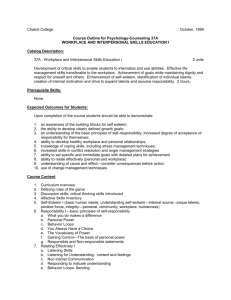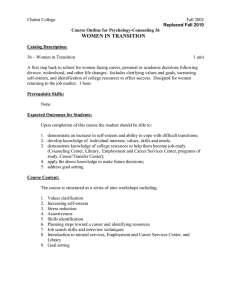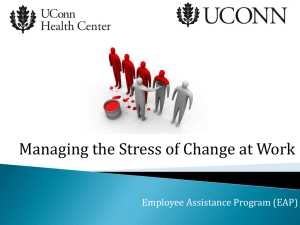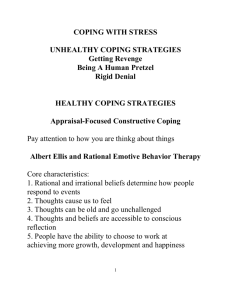Chabot College October, 1999 Course Outline for Psychology-Counseling 37B
advertisement
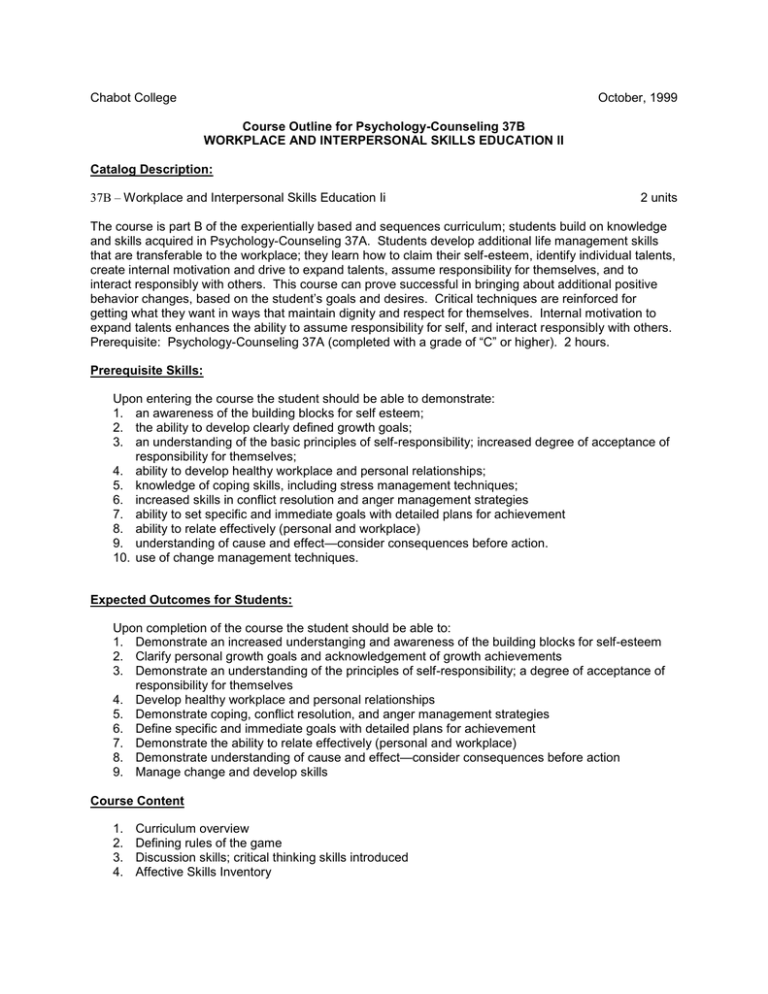
Chabot College October, 1999 Course Outline for Psychology-Counseling 37B WORKPLACE AND INTERPERSONAL SKILLS EDUCATION II Catalog Description: 37B – Workplace and Interpersonal Skills Education Ii 2 units The course is part B of the experientially based and sequences curriculum; students build on knowledge and skills acquired in Psychology-Counseling 37A. Students develop additional life management skills that are transferable to the workplace; they learn how to claim their self-esteem, identify individual talents, create internal motivation and drive to expand talents, assume responsibility for themselves, and to interact responsibly with others. This course can prove successful in bringing about additional positive behavior changes, based on the student’s goals and desires. Critical techniques are reinforced for getting what they want in ways that maintain dignity and respect for themselves. Internal motivation to expand talents enhances the ability to assume responsibility for self, and interact responsibly with others. Prerequisite: Psychology-Counseling 37A (completed with a grade of “C” or higher). 2 hours. Prerequisite Skills: Upon entering the course the student should be able to demonstrate: 1. an awareness of the building blocks for self esteem; 2. the ability to develop clearly defined growth goals; 3. an understanding of the basic principles of self-responsibility; increased degree of acceptance of responsibility for themselves; 4. ability to develop healthy workplace and personal relationships; 5. knowledge of coping skills, including stress management techniques; 6. increased skills in conflict resolution and anger management strategies 7. ability to set specific and immediate goals with detailed plans for achievement 8. ability to relate effectively (personal and workplace) 9. understanding of cause and effect—consider consequences before action. 10. use of change management techniques. Expected Outcomes for Students: Upon completion of the course the student should be able to: 1. Demonstrate an increased understanging and awareness of the building blocks for self-esteem 2. Clarify personal growth goals and acknowledgement of growth achievements 3. Demonstrate an understanding of the principles of self-responsibility; a degree of acceptance of responsibility for themselves 4. Develop healthy workplace and personal relationships 5. Demonstrate coping, conflict resolution, and anger management strategies 6. Define specific and immediate goals with detailed plans for achievement 7. Demonstrate the ability to relate effectively (personal and workplace) 8. Demonstrate understanding of cause and effect—consider consequences before action 9. Manage change and develop skills Course Content 1. 2. 3. 4. Curriculum overview Defining rules of the game Discussion skills; critical thinking skills introduced Affective Skills Inventory Chabot College Course Outline for Psychology-Counseling 37B, Page 2 October 1999 ] 5. Self-Esteem II—(examine own behavior in a new way) a. Self-Esteem: What your actions say b. Creating Positive Self-talk c. Expectations for Yourself d. Creating Growth Goals e. Expectations of Others 6. Responsibility II—(learning to be proactive reactive in daily life) a. Winners and Losers b. Choosing Feelings c. Winners’ and Losers’ Choices d. Creating Growth Goals e. Responsibility to Others f. Responsibility for Yourself 7. Relating Effectively II—(Learns skills to operate with higher degree of responsibility. Learns to deal with refusals, say No in the face of pressure, handles put-downs) 8. Praise and Encouragement a. Creating Growth Goals b. Feedback that Empowers c. Asking for What You Want d. Handling Refusals (or rejection) e. Saying No f. Positive Strokes g. Myths about Strokes h. Handling Put-downs 9. Responsibility III—(focus on conflict resolution; dissipate anger, identify issues under anger and to negotiate with others to a Win/Win solution a. Understanding Anger b. Creating Growth Goals c. Ineffective Responses to Anger d. How Anger Develops e. Handling Anger Effectively 10. Self-Esteem III—(designed to energize students by focusing on the positive and reflecting on the positive changes they have made in their lives) a. Reflecting on Concepts and Growth b. Creating Growth Goals c. Growth “I’ve” Noticed in Others 11. Responsibility IV—(focus on learning how to consider consequences before taking action) a. Understand Risks b. Dealing with Fear c. Handling Stress d. Stress Coping I e. Stress Coping II f. Stress Coping III 12. Self-Esteem IV—(focus on positive internal qualities, identify developed skills, assume responsibility for evaluating own growth from the beginning of the class) a. Identifying success b. Sharing Success c. Affective Skills Inventory d. Evaluating Growth e. Sending Positive Invitations 13. Conclusion (helps students address and deal positively with the dissolution of the strong supportive environment they created—realizing it is a new beginning rather than an end) a. Future Goals b. Closure Chabot College Course Outline for Psychology-Counseling 37B, Page 3 October 1999 ] c. Graduation Methods of Presentation: 1. 2. 3. 4. Lecture Discussion Assessment Lab Typical Assignments 1. 2. Completion of the Affective Skills Inventory Role-plays—Verbal Communication—students demonstrate knowledge and practical applications by responding to scripted situations Methods of Evaluating Student Progress: 1. 2. 3. 4. 5. Student self-assessment Instructor observations Individual interviews Participation Completion of personal development profile workbook activities Textbook(s) (Typical): Lifelines, Sharan B. Merriam, M. Carolyn Clark, Jossey-Bass Publishers, 1991 Special Student Materials: Personal Development Profile Workbook (revised with permission from Personal and Social Responsibility program by Constance Dembrowsky, Institute of Affective Skills Development, 1988) c:\documents\word\outlines\pscn\pscn 37b .doc
